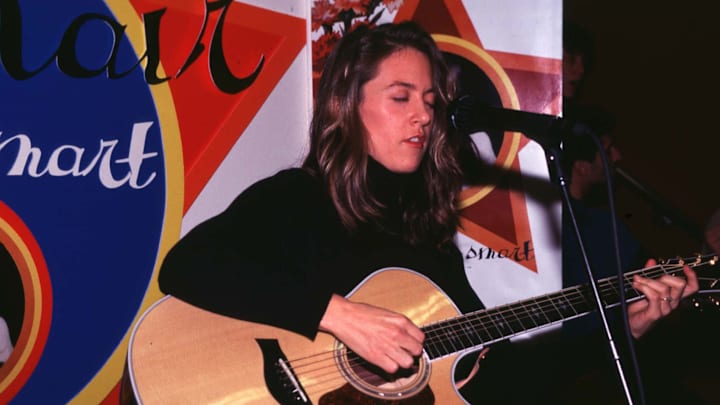Exile in Guyville by Liz Phair (1993)
Exile in Guyville is among the most lauded lo-fi albums ever recorded, and yet, for many years, it was a ghost. It had gone in and out of print until a 25th anniversary reissue made it accessible to younger listeners for whom it was more legend than album.
As with Springsteen’s Nebraska, Exile in Guyville began as a series of songs recorded at home on cassette. As with Bratmobile, a lot of her subject matter was what it meant to be a woman in a male-dominated world. At some early point in the creation of these songs, she hit on the idea of having Exile in Guyville be a kind of response to the Rolling Stones’ Exile on Main Street, though listeners could certainly enjoy it if they never heard “Sweet Virginia” or “Tumbling Dice.”
What hits you first and foremost when you listen to Guyville is that Phair does not possess a great voice. It’s an adequate voice. She can sing. But there’s nothing in it that would wow the judges at a singing competition. Except this – and this may sum up the beauty of lo-fi better than anything else I can say. Phair comes off as authentic. We never know the artists we listen to. We never know if they are revealing themselves or putting up a front. But Phair sounds so overwhelmingly real that, whether it’s true or not, she convinces us that we are getting an honest human experience.
Of course, that wouldn’t really matter if she weren’t an incisive writer who fills her songs with cogent details and universal truth. With wry humor and aching pain. Phair caused a stir with the sexually graphic nature of her lyrics in 1993. The extraordinary balance between the sweetness of the nursey-rhyme chorus and the overt sexuality of “Flower” (with its famous/notorious line “I just want to be your “b*****b queen’), demanded attention. But the never-ending wealth of poetic observation of the characters and situations in her life is what really got under the skin.
Phair didn’t have to use profanity to make her point. “The Divorce Song” remains a spectacular portrait of miscommunication (OK – there’s one “f**k” in there, but it’s barely there.) “You’ve never been a waste of my time – It’s never been a drag – So take a deep breath and count back from ten – And maybe you’ll be all right,” shows a writer not laser-focused on assessing blame, but on understanding what it is that went wrong.
Some songs consist almost entirely of Phair alone, like the moody, beautiful “Canary,” which is essentially just piano and voice. Other songs get the full band treatment, like “Help Me Mary.” But it never sounds pasteurized. They are like what your friends would sound like practicing in the basement – providing your friends had one of the best songwriters in the world penning their tunes.
